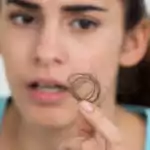PCOS test is based on the Rotterdam criteria for diagnosing PCOS.

Living Well
Hair loss is a universal problem that is faced by women all over the world. Hair loss can be triggered by a number of causes such as stress, pollution, results of medications used for diseases like cancer etc. One of the common causes of hair loss among women is a hormonal imbalance. Let’s look at the causes of hormonal hair loss and tips to deal with it.
The two main sex hormones found in females are oestrogen and progesterone. Oestrogen, which is produced in the ovaries, is responsible for your feminine features by shadowing the effects of the testosterone (that is also present in the female body in traces). This hormone is a woman’s best friend as it promotes hair growth on head while reducing it on the other parts of the body. The relation between hair loss and oestrogen is seen in two distinct stages of life:
Other instances where oestrogen plays foul and causes hormonal hair loss is if you suddenly stop taking birth control pills. Apart from being used for preventing pregnancy, birth control pills are also a common medication prescribed for Polycystic Ovarian Syndrome (PCOS). These medicines contain oestrogen, and if the supply of oestrogen stops it leads to hormonal hair loss. Women who undergo cancer treatment could also have similar effects as the function of their ovaries could get disrupted. Similarly, those who undergo hysterectomy (removal of the ovaries surgically) can see a huge drop in their levels of oestrogen.
Tips To Deal With It
One of the most common problems faced by young women today is PCOS. This condition is on a rise due to unhealthy lifestyles, improper dietary habits and lots of stress. PCOS affects the body in a number of ways and one of them is hormonal hair loss.
The relation between PCOS and hormonal hair loss is linked to hyperandrogenism, an unnatural increase of androgen (male sex hormone) that happens during PCOS. Because of this, the type of hair fall in women looks similar to that seen among men where you lose more hair around the frontal part of your head.
PCOS also triggers a rise in the testosterone levels in the female body that get converted to Dihydrotestosterone (DHT.) DHT could block the hair follicle and alter the process of normal hair growth.
Tips To Deal With It
Diabetes is a disease that is caused due to the body’s incapability to either manufacture or respond to insulin. Depending on how insulin is unable to act, diabetes can be of two types: Type 1 (where the body does not produce insulin) and type 2 (where the insulin produced is not utilized properly.) Diabetes is a common cause of hormonal hair loss. High levels of blood sugar in your body can interfere with the mechanism of hair growth that happens in three phases – active growing phase, resting phase and the shedding phase.
Improper insulin function can also cause Alopecia Areata (when hair loss happens in certain spots.) This is a condition caused by the immune system attacking the hair follicles. In this case, usually there are very less chances of growing hair back or even if they grow back, it is unlikely that they would last for long.
Tips To Deal With It:
PCOS Hair Loss: Causes & Lifestyle Changes To Control The Damage
https://www.hairsentinel.com/estrogen-and-hair-loss.html
https://www.philipkingsley.com/hair-guide/female-hair-loss/polycystic-ovarian-syndrome-pcos/
https://www.statista.com/statistics/489025/value-of-the-global-hair-loss-treatment-market/
https://www.headcovers.com/resources/hair-loss/polycystic-ovarian-syndrome-pcos-hair-loss